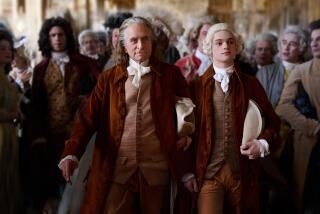New View of Old Ben
- Share via
This year publishers are flooding bookstores with works lamenting how U.S. political and business leaders in the 1990s lost sight of the ideals on which the United States was founded. One new book, however, rises above wistfulness and recreates that original vision.
A biography of Benjamin Franklin by Edmund S. Morgan breathes new life into core American values. Franklin combined charity, curiosity (which led him to invent everything from bifocals to a stove) and frugality (“Make no Expence but do good to others or yourself: i.e., Waste nothing”). He was no saint, but that makes him all the more believable as an antidote to self-absorption and materialism.
The 86-year-old Morgan, an emeritus history professor at Yale, is revered by many historians for his rebuttals of shopworn orthodoxies. For example, his 1944 book “The Puritan Family” showed how the rituals and beliefs of “ordinary” Americans, then disregarded as historically insignificant, helped shape history. In 1975, Morgan’s “American Slavery, American Freedom” showed that the colonies’ demands for greater freedom, portrayed as yearnings for liberty and justice, were largely driven by white colonialists’ sense of entitlement upon acquiring black slaves. In 1990, Morgan’s “Inventing the People” showed how business and political leaders clothe self-interested agendas in democratic, populist language.
Morgan is just as provocative in debunking conventional wisdom about Franklin. Whereas the dull schoolbook depictions of Franklin portray a modest, portly man who advocated chastity and temperance, Morgan’s Franklin is an athletic man, swimming in chilly rivers into his 70s, who had numerous affairs in which he succumbed, in his own words, to “that hard-to-be govern’d Passion of Youth.” He was also ambitious, if slyly so. As Morgan puts it, Franklin believed that “the way to advance oneself was to show no interest in advancing it. He was, in a sense, too vain to allow a show of vanity to diminish his reputation.”
Most provocative of all is Morgan’s depiction of how Franklin spent most of his life campaigning for causes in which he did not himself believe. He spent “10 years arguing for a natural right [to own property] that existed in American opinion but not quite in his own. He then spent eight years in charming the French into helping the Americans fight a war against the British, even though he believed that war was not a cost-effective way of settling differences.”
Were Franklin alive today, unforgiving pundits might dismiss him as a spineless hypocrite. Morgan, however, recognizes that America’s greatest leaders have been torn between their respect for democracy and their own sense of what’s right. To him, Franklin was “a man with a wisdom about himself that comes only to the great of heart. Franklin knew how to value himself and what he did without mistaking himself for something more than one man among many. His special brand of self-respect required him to honor his fellow men and women no less than himself.”
More to Read
Sign up for our Book Club newsletter
Get the latest news, events and more from the Los Angeles Times Book Club, and help us get L.A. reading and talking.
You may occasionally receive promotional content from the Los Angeles Times.







